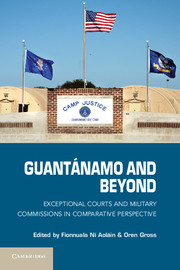Book contents
- Frontmatter
- Contents
- Contributors
- Acknowledgments
- Introduction: Guantánamo and Beyond
- Part I Military Commissions and Exceptional Courts in the United States
- Part II Exceptional Courts and Military Commissions Elsewhere
- Part III International Law, Exceptional Courts, and Military Commissions
- Index
- References
Introduction: Guantánamo and Beyond
Exceptional Courts and Military Commissions in Comparative and Policy Perspective
Published online by Cambridge University Press: 05 June 2014
- Frontmatter
- Contents
- Contributors
- Acknowledgments
- Introduction: Guantánamo and Beyond
- Part I Military Commissions and Exceptional Courts in the United States
- Part II Exceptional Courts and Military Commissions Elsewhere
- Part III International Law, Exceptional Courts, and Military Commissions
- Index
- References
Summary
THE MILITARY COMMISSIONS SCHEME ESTABLISHED BY President George W. Bush on November 13, 2001, has garnered considerable national and international contro-versy. The commissions’ creation has focused significant global attention on the use of military courts as a mechanism to process and try individuals suspected of involvement in terrorist acts or offenses committed during armed conflict. As this book goes to press, the military commissions are still operational with President Obama indicating recently that he had asked the Department of Defense to designate a site in the United States where further military commissions' proceedings would be held. Upon taking office in 2008, President Obama signed an executive order requiring the closure of the detention center at the U.S. Naval Base in Guantánamo Bay, Cuba, within a year. In the intervening twelve months various alternatives were explored including freeing those prisoners whose petitions for habeas corpus were successful, placing other prisoners on trial before military commissions or civilian courts, and seeking an alternative holding location for those individuals likely to remain incarcerated without trial. Despite substantial hand wringing nationally and internationally, a large group of individuals remains incarcerated at Guantánamo, and for some of them, operational progress to trial before a military tribunal continues. The Obama administration relinquished its earlier position that indefinite detention without trial was not acceptable in a democratic society, and reinstated the full, if moderately amended, operation of the military commissions.
Framed by and against this political backdrop, this collection addresses the phenomena of what we broadly term “due process excep-tionalism.” The essays included in this collection bring together the viewpoints of leading international, comparative, national security, and legal history experts from the United States and elsewhere. The collection also benefits from contributions by policy makers who offer policy-oriented analyses of the structural, legal, and political issues arising out of the use of exceptional courts and military commissions. These contributions include assessments of the relationship between exceptional courts and other intersecting and overlapping arenas in the context of U.S. domestic constitutional law, international law, international human rights law, and international humanitarian law; the patterns, similarities, and disjunctions that emerge as we view the process of resorting to such courts in comparative perspective; and the political and legal challenges that the creation or operation of such courts creates within states and for the international community.
- Type
- Chapter
- Information
- Guantánamo and BeyondExceptional Courts and Military Commissions in Comparative Perspective, pp. 1 - 34Publisher: Cambridge University PressPrint publication year: 2013
References
- 2
- Cited by



